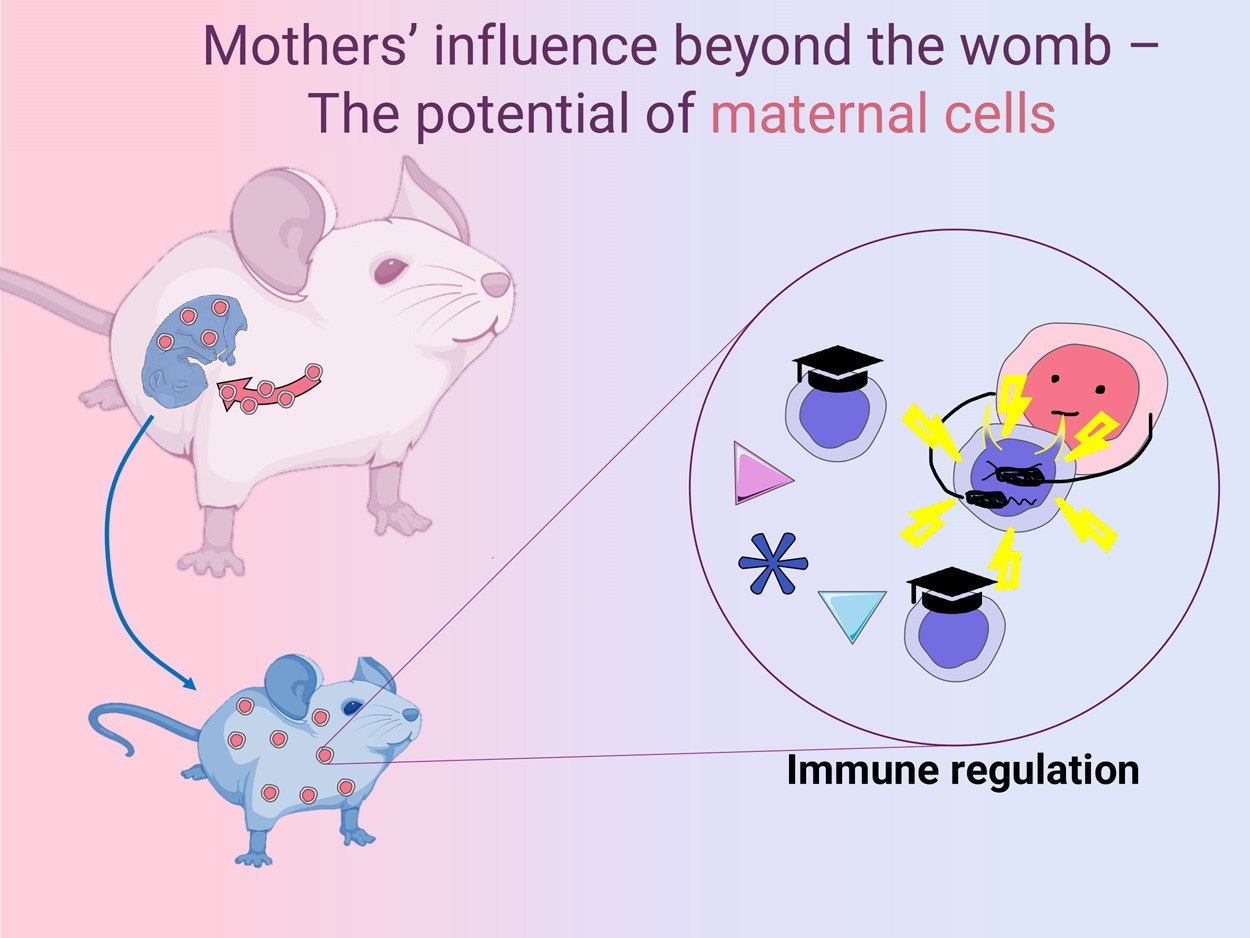DATE2022.11.09 #Press Releases
Mother’s cells acquired by babies may help regulate their immune system
By eliminating maternal cells acquired during pregnancy, scientists offer clues to their role in shaping the mice pups’ immune system.
November 09, 2022
After birth, the babies receive more than their mother’s love. During pregnancy and breastfeeding, cells from the mother migrate to the baby and persist for decades after birth. A new study by Dr. Flore Castellan and Prof. Naoki Irie from the University of Tokyo suggests that depleting the maternal cells in mice pups could lead to early activation of the pup’s immune system, potentially increasing the risk of allergies and autoimmune disorders.
Why the maternal cells remain in babies long after birth has puzzled researchers for years. Scientists have speculated that maternal cells in babies aid in developing their immune system and repairing damaged tissue.

Fig :Maternal cells may be involved in regulating pups’ immune system. (Illustration: Flore Castellan. Created using Servier Medical Art).
To understand the role of maternal cells in mice pups, the researchers selectively removed most of the maternal cells by introducing a gene that encodes a receptor for a toxin called diphtheria toxin in the pups’ mother. When diphtheria toxin is injected into pups, it attaches to the receptors on acquired maternal cells and kills them. The researchers injected the toxin every other day for two weeks to deplete the maternal cells transferred during gestation and avoid acquiring new ones via lactation. After two weeks, they obtained a snapshot of the type and proportion of immune cells activated in the spleen, the main reservoir of immune cells. Then they compared the immune cell profiles of the pups with and without the maternal cells.
“We expected to find less activated and less matured immune cells in the pups without the maternal cells, but we found the opposite,” said Dr. Castellan, a Ph.D. graduate, and the first author of the research article.
They discovered that depleting maternal cells increased the activation of white blood cells such as T cells and Natural Killer (NK) cells in the spleen of pups. Given that the pups are exposed to a plethora of new antigens and potential allergens after birth, it makes sense that the immune system should not be too active. And maternal cells appear to make sure that the babies’ immune system does not overreact to the variety of new antigens nor attack its own cells. This result matches well with another finding from the Irie lab. Recently they found a variety of immune-related maternal cells, including antigen-presenting cells that are passed on to the fetus (Fujimoto et al. Scientific Reports 2022*), presumably with various antigens and immunological information. In other words, maternal cells can help instruct the immune system of the pups on what to react against through non-genetic means.
Additionally, even though the researchers used genetically identical pups for the experiments, they found that the pups varied in proportion and cell type repertoire of the maternal cells. The natural variation in maternal cell activation may indicate why some pups rarely react with the maternal cells while others do not react at all. Such differences may thus provide clues to treating autoimmune disorders that are considered to involve the conflict between maternal cells and pup’s cells.
Although the current study revealed a possible role of maternal cells in mouse pups, we know little about their role in human babies. Prof. Irie and his colleagues have been collaborating with pediatric surgeons to understand the role of maternal cells in the livers of babies with biliary atresia, a disease where the baby is born with abnormal bile ducts.
“We do not know how maternal cells themselves are controlled and how they affect pups’ immunity over the long term. Why don't maternal cells attack the cells of the pups? Or how are they organized inside? Where do they stay? So, there are still a lot of questions to understand,” said Dr. Castellan, who aspires to continue her research on human patients.
*Kana Fujimoto, Akira Nakajima, Shohei Hori, Yumiko Tanaka, Yoshitaka Shirasaki, Sotaro Uemura and Naoki Irie. “Whole-embryonic identification of maternal microchimeric cell types in mouse using single-cell RNA sequencing,” Scientific Reports: November 02, 2022, doi: 10.1038/s41598-022-20781-9
Publication details
Journal Biology Open Title Postnatal depletion of maternal cells biases T lymphocytes and natural killer cells' profiles towards early activation in the spleenAuthor Flore S. Castellan*, Naoki Irie*DOI
Podcast credits
Music: "Upbeat Forever" Kevin MacLeod (incompetech.com)
Sound effect: Mice sound effect, Zapsplat.com
Podcast host: Ravindra Palavalli-Nettimi



